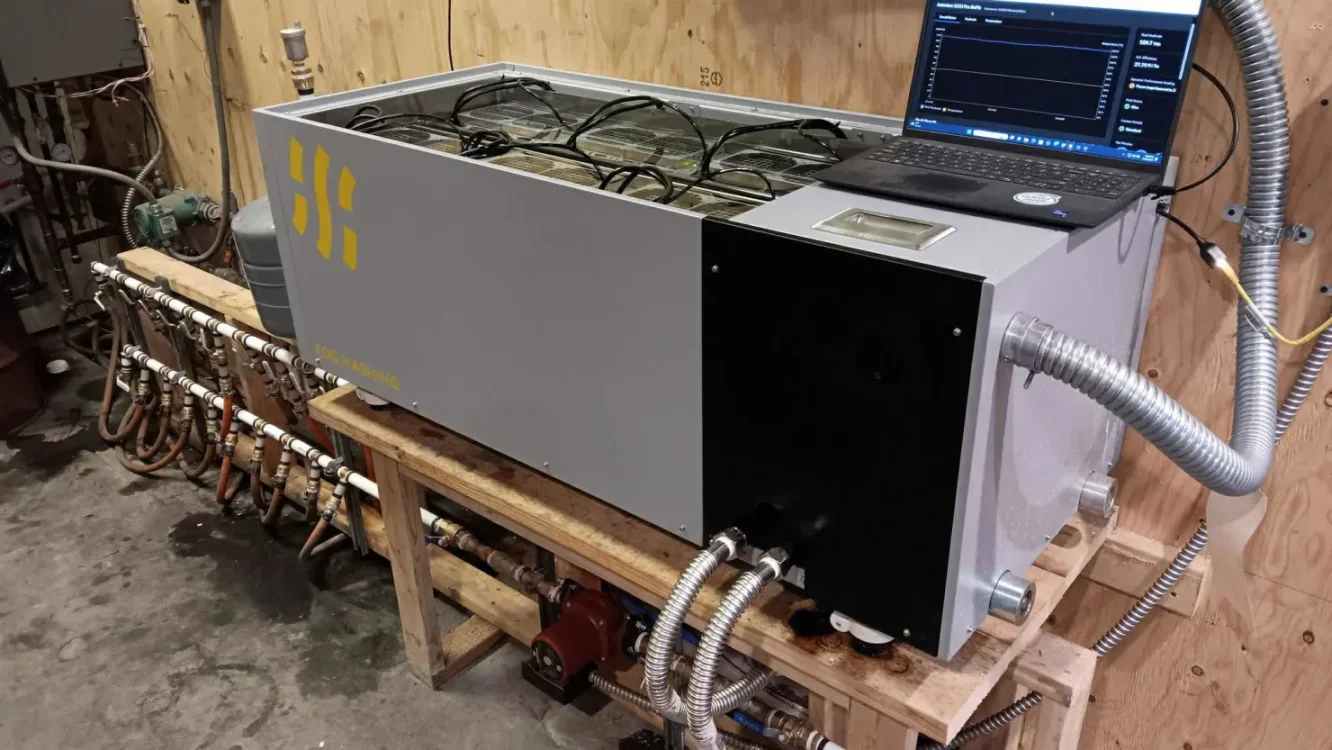This emerging cryptocurrency heating market is inefficient in providing warmth and controlling energy costs.
Written by: Kevin Williams, CNBC
Translated by: AididiaoJP, Foresight News
Summary
Entrepreneurs are actively trying to turn the heat generated from cryptocurrency mining into valuable products.
Analysis from digital asset brokerage K33 shows that the waste heat produced by Bitcoin mining each year is enough to meet the heating needs of Finland, but most of this heat is directly released into the atmosphere.
This situation has led to the creation of new products—such as a $900 space heater that also functions as a Bitcoin mining machine. However, skeptics point out that this emerging cryptocurrency heating market is inefficient in providing warmth and controlling energy costs.
As a cold wave sweeps across the United States, electricity expenses have become a significant consideration in household budgets. While most Americans still rely on traditional heating methods (home heating oil, natural gas, and electric heaters), in some households, cryptocurrency mining is becoming a source of heat. According to predictions from pioneers in the cryptocurrency heating industry, this new heating method will become widespread in thousands of homes in the future.

The basic principle is that cryptocurrency mining generates a large amount of heat, most of which is ultimately released as waste gas. Data from K33 shows that Bitcoin mining produces about 100 terawatt-hours (TWh) of waste heat each year, enough to meet the heating needs of Finland. In this energy-intensive industry, this energy waste phenomenon is driving entrepreneurs to explore new ways to utilize waste heat, especially in winter for heating homes, offices, and other places.
During this year's cold wave, The New York Times tested the HeatTrio product, which is both a $900 space heater and a Bitcoin mining machine. Some users have also used the heat generated from home cryptocurrency mining machines to heat entire residences.
Jill Fort, CEO of Dallas-based sustainable Bitcoin mining company Bitford Digital, stated, "I've seen Bitcoin mining machines running quietly in attics, using the home's ventilation system to channel heat indoors to offset heating costs. This waste heat utilization solution is very clever." She emphasized, "As long as you are creative, utilizing the waste heat from mining machines is a typical case of cryptocurrency miners becoming energy partners."
Although this solution may not directly save on electricity bills, the specific economic benefits are influenced by local electricity prices and the computing power of the mining machines, but it may cover part of the heating costs through mining profits.
Fort calculated, "Heating costs are comparable to traditional methods, but the added benefit is that you simultaneously gain Bitcoin profits."
Even using old mining machines can meet the demand. Individual miners can join mining pools to share computing power and receive stable returns proportionally, thus changing the cost-benefit equation.
Andrew Sobko, founder of Argentum AI, which is building a computing power-sharing market, analyzed, "The theory of using cryptocurrency mining or GPU computing for residential heating is clever because almost all computing energy consumption ultimately converts to heat energy." However, he added that this model is more feasible in large scenarios, especially in high-density buildings like data centers in cold regions, where industrial-grade waste heat recovery truly shows its potential.
The key to implementation lies in spatial matching; heat cannot be transported by vehicles and must have computing devices deployed in places that need heat sources, from industrial parks to residential areas, all of which are potential application scenarios.
Sobko revealed, "We are working with partners to channel computing heat into building heating systems and even agricultural greenhouses. These scenarios can truly achieve a win-win in economic and environmental benefits." He vividly compared, "It's not about transporting heat, but about making computing happen where heat energy is needed."
Skepticism: Why Cryptocurrency Heating Is Hard to Become Mainstream
There are also many opponents.
Derek Moore, a clinical associate professor at the Simon Business School at the University of Rochester, believes that cryptocurrency is not the future of home heating, even industrial applications have flaws.
According to his analysis, Bitcoin mining has become highly specialized, and home computers or even home computer networks are almost impossible to successfully mine blocks because professional mining farms use specialized chips with computing power far exceeding that of home devices.
"Ten years ago, home Bitcoin mining might have yielded some returns, but that time has long passed," Moore stated bluntly.
He analyzed market products: "The so-called Bitcoin heating devices are essentially ordinary electric heaters, and heating with residential electricity prices is not efficient at all." He emphasized the core contradiction: "Although Bitcoin mining produces considerable heat, to use this heat for homes, the energy consumed is still the user's own electricity."
Moore also calculated the economics: while computers continuously run and produce heat, the probability of successfully mining is minuscule.
"This is essentially a false proposition, using the public's understanding of Bitcoin waste heat and mining profits to create the illusion that individuals can also profit from it," he concluded.

A Glimmer of Hope: The Potential of Distributed Mining Machines
However, experts point out that as plug-and-play independent mining machines become more common, this model may show feasibility in more scenarios. At least based on the characteristic that "mining inevitably produces heat," its dual-track benefits are worth further study.
Niki Morris, executive director of the Ralph L. C. Energy Institute at Texas Christian University, explained, "The key lies in capturing and utilizing waste heat; whether for home heating, hot water preparation, or even pool heating, it can enhance energy utilization efficiency."
She pointed out that cryptocurrency heating is still in its infancy, and there are blind spots in public understanding. "This is precisely where the research value lies. Our school is working with industry partners to build a technical system and business application model together."
Morris particularly emphasized the unique advantages of cryptocurrency: "The output of mining is tradable digital assets, which creates a new revenue channel for electricity consumption." She likened it to electric vehicle charging stations: "Imagine a mining device in an apartment building that simultaneously produces digital currency and usable heat; this will open new windows for distributed energy innovation."
Although challenges such as efficiency optimization, multi-energy complementarity, and policy regulation still need to be addressed, Morris predicts, "As technology evolves, cryptocurrency heating will not only be a novel concept but will also signify the accelerated integration of the digital world and physical energy systems in the future."
Practical Knowledge: Heating Experiments in Idaho
The future of cryptocurrency heating is quietly taking shape in Challis, Idaho. Cade Peterson's company Softwarm is using Bitcoin waste heat to withstand the harsh winter.
Several local shops are testing Softwarm mining machines for mining heating. TC Auto Truck and RV Wash used to spend $25 a day heating the wash bay to melt snow and heat water; the owner reported, "Traditional heaters purely consume energy, but now the profits generated by the Bitcoin mining machine exceed the operating costs." An industrial concrete company even uses waste heat from mining machines to heat a 2,500-gallon water tank, saving thousands of dollars a month.
Peterson has been using a Bitcoin mining machine to heat his home for two and a half years, and he firmly believes that heat energy will drive the future: "In the near future, the water heaters people buy will come with data interfaces, and Bitcoin will become a daily source of heat."
免责声明:本文章仅代表作者个人观点,不代表本平台的立场和观点。本文章仅供信息分享,不构成对任何人的任何投资建议。用户与作者之间的任何争议,与本平台无关。如网页中刊载的文章或图片涉及侵权,请提供相关的权利证明和身份证明发送邮件到support@aicoin.com,本平台相关工作人员将会进行核查。




